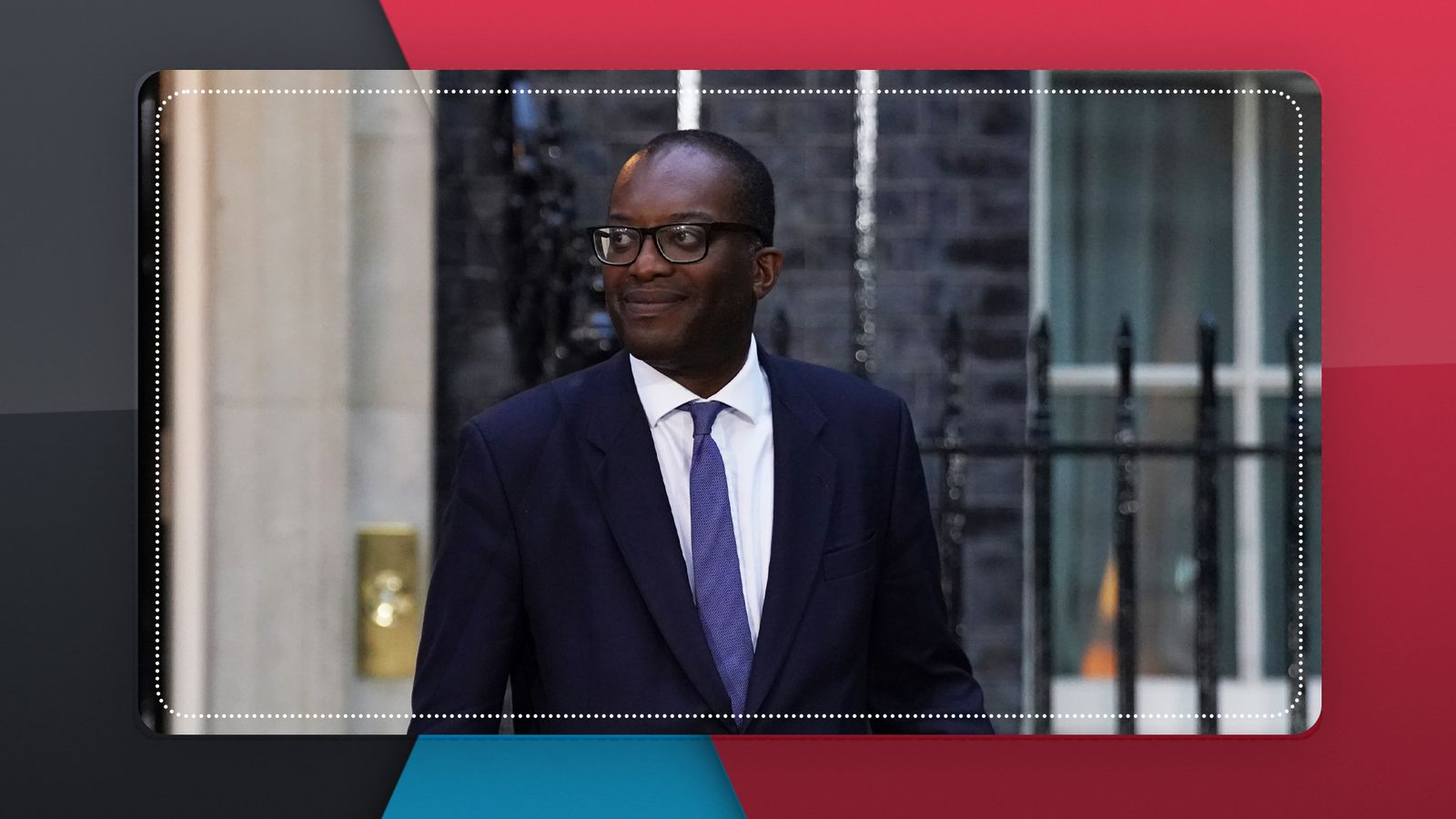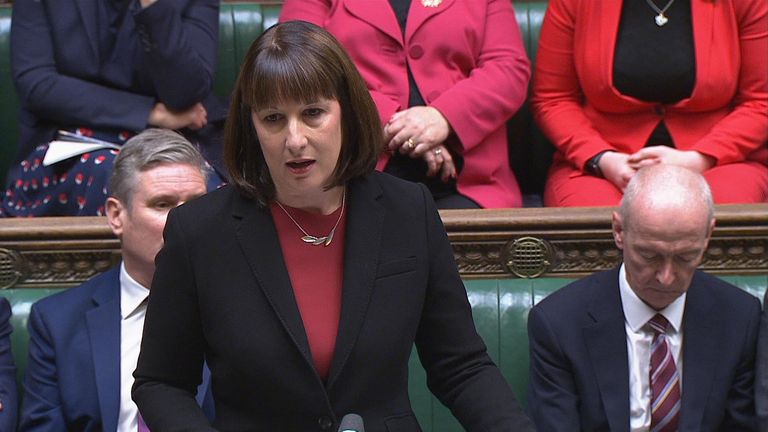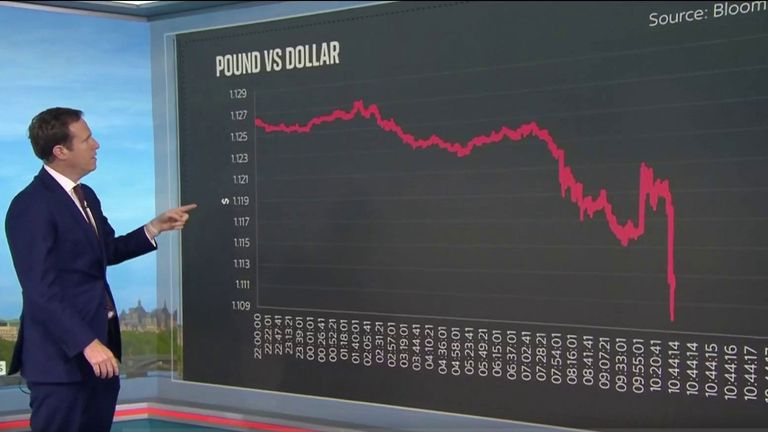Income tax will be cut by one penny, Chancellor Kwasi Kwarteng has announced, as part of a raft of measures aimed at boosting economic growth.
The reduction in the basic rate from 20% to 19% will be introduced in April 2023 – one year earlier than planned.
At the same time, the 45% top rate of tax will be abolished with a single higher band of 40%.
The planned increase in corporation tax from 19% to 25% will also be axed, while stamp duty will be cut for homebuyers.
The mini-budget, called the “growth plan” by the government, comes as the UK faces a cost of living crisis, soaring inflation and climbing interest rates.
The chancellor had already confirmed the National Insurance hike introduced by Boris Johnson’s government to pay for social care and tackling the NHS backlog will be reversed on 6 November.
Economists have described the chancellor’s announcement as the “biggest tax-cutting event since 1972”.
It is understood the tax cuts will cost £45bn.
In his Commons statement, the chancellor also announced:
- Duty frozen on beer, wine, cider and spirits
- Caps on bankers’ bonuses will be axed as part of wider City deregulation
- New investment zones will be created with targeted tax cuts and relaxed planning laws
- Plans to speed up major infrastructure projects, including roads, railways and energy projects
- Moves to impose tighter conditions on unions wanting to strike with pay offers put to a vote
The government argues the action being taken will help bolster economic growth and increase the tax to fund public services.
But critics argue the measures are a risk when public debt is already high and the cost of borrowing is rising.
Mr Kwarteng said economic growth was “not as high as it should be”, arguing this had “made it harder to pay for public services” and in turn led to higher taxes.
He said: “We need a new approach for a new era, focused on growth.
“Our aim, over the medium term, is to reach a trend rate of growth of 2.5%. And our plan is to expand the supply side of the economy through tax incentives and reform.”
He said this will deliver higher wages, greater opportunities and fund public services.
Mr Kwarteng added: “For too long in this country, we have indulged in a fight over redistribution. Now, we need to focus on growth, not just how we tax and spend.
“Today, we have cut stamp duty, we have allowed businesses to keep more of their own money to invest, to innovate, and to grow, we have cut income tax and national insurance for millions of workers, we are securing our place in a fiercely competitive global economy with lower rates of corporation tax and lower rates of personal tax.
“We promised to prioritise growth. We promised a new approach for a new era. We promised to release the enormous potential of this country. Our growth plan has delivered all those promises and more.”
Read more:
Stamp duty, energy bills and alcohol duty: The key mini-budget announcements
Truss admits her tax cuts will disproportionately benefit the rich
Who is Kwasi Kwarteng?
Labour’s shadow chancellor Rachel Reeves argued the chancellor’s statement was an “admission of 12 years of economic failure” by the government.
Ms Reeves told MPs: “We have had six so-called plans for growth from the Conservatives since 2010… a litany of failure every single one of them.
“The prime minister and chancellor are like two desperate gamblers in a casino chasing a losing run.
She added: “It is all based on an outdated ideology that says if we simply reward those who are already wealthy, the whole of society will benefit.
“They have decided to replace levelling up with trickle down.”
Lib Dem leader Sir Ed Davey said: “City bankers will be popping the champagne while struggling families worry about how they afford the weekly shop.
“It is not a plan, it’s a recipe for disaster.”
The chancellor’s statement also sharply divided opinion beyond Westminster.
CBI chief Tony Danker said: “Today is day one of a new UK growth approach. We must now use this opportunity to make it count and bring growth to every corner of the UK. Fifteen years of anaemic growth cannot be repeated.”
Shevaun Havilland of the British Chambers of Commerce (BCC), said: “Businesses will welcome many of the measures announced today that should boost economic growth, relieve cost pressures and encourage investment.”
But TUC general secretary Frances O’Grady said: “At the first opportunity, Liz Truss is holding down wages and lining the pockets of big corporations and City bankers.”
Rebecca McDonald, chief economist at the Joseph Rowntree Foundation said: “This is a budget that has wilfully ignored families struggling through a cost of living emergency and instead targeted its action at the richest.”
The chancellor has also faced criticism for refusing to publish an economic forecast by the independent Office for Budget Responsibility (OBR) alongside the mini-budget, sparking claims he is avoiding scrutiny.
The lack of OBR data means there will be no independent analysis of whether the announcements breach the government’s existing budget rules or their impact on growth.
Conservative chair of the Treasury Select Committee Mel Stride said it meant there was a “vast void” at the centre of the statement.
Responding, Mr Kwarteng said the OBR would produce a forecast “before the end of the calendar year”.
Paul Johnson, from the Institute for Fiscal Studies, called the chancellor’s statement “quite extraordinary”.
He said: “It was like having an entirely new government.
“This was the biggest tax-cutting event since 1972, it is not very mini. It is half a century since we have seen tax cuts announced on this scale.”


